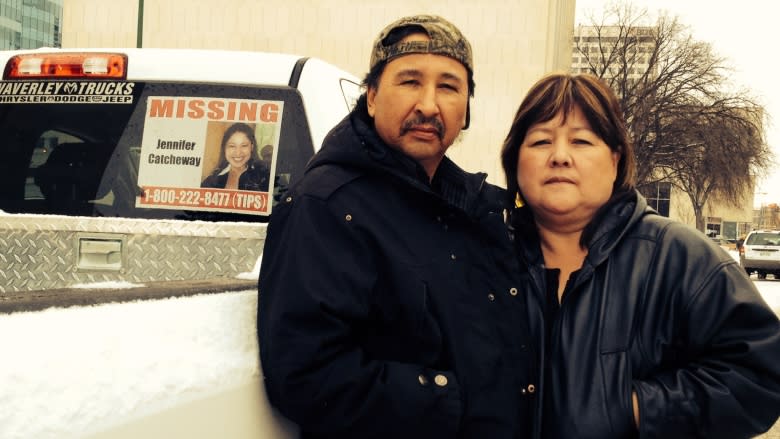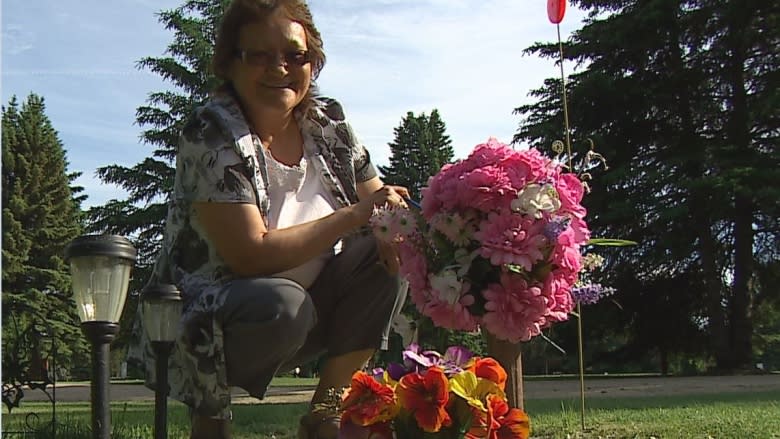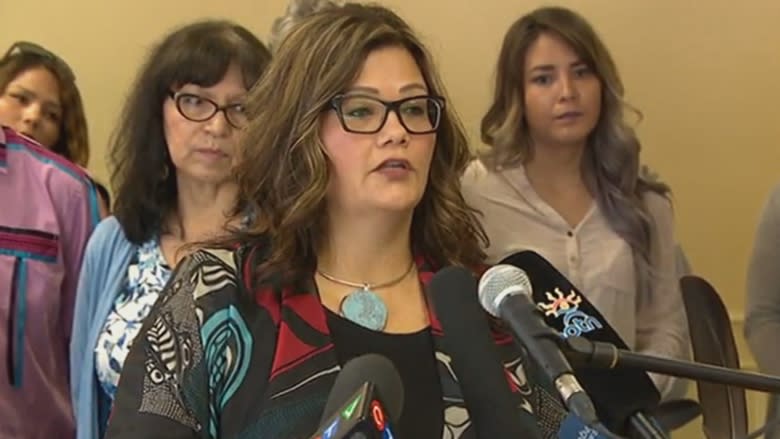Manitoba family split on testifying at MMIWG inquiry
They lived just a few houses apart. Jennifer Catcheway and Rocelyn Gabriel were cousins and grew up in Portage la Prairie, Man.
Both of their lives were cut short and their names are now on the list of more than 1,200 missing and murdered Indigenous women and girls across Canada.
However, only one of their families is taking part in the National Inquiry into Missing and Murdered Indigenous Women and Girls, which is in Winnipeg this week.
"I just want to tell the world we had a daughter and that she was stolen from us," said Bernice Catcheway. "You can't just go stealing and murdering these young ladies, somebody has to be accountable for that."
For nine years, the couple has searched ditches, fields, lakes and garbage dumps all over Manitoba, hoping to find their daughter's remains. Jennifer was last seen in Grand Rapids, Man., on June 19, 2008. Her case is considered a homicide.
Catcheway and her husband Wilfred, are testifying on Tuesday. They are one of 75 families and survivors who are registered.
The mother says they've chosen to give their testimony in a public hearing because they now speak for their daughter.
"I want everybody to know our pain," she said. "They not only stole her, but they destroyed our lives as well."
Catcheway said she is going into the process with an open mind, but is feeling cautious because of the turmoil the MMIWG inquiry has faced.
That turmoil is enough to turn off Joyce Gabriel altogether. She said she doesn't want to testify because she thinks her daughter's story will just become another number.
"How many hearings have they gone through?," she said. "I feel they all heard the same story and it's just basically going to be saying it all over and over again, but different families."
This is the third community hearing and the first in the prairies. The national inquiry first took statements in Whitehorse in the end of May and was in Smithers, B.C., the last week of September.
The inquiry has been criticized for asking families to tell their story numerous times before they can actually share on the public record.
Gabriel said she registered initially and did an intake interview, but found it was too much to re-tell Rocelyn's story.
"Halfway through I said 'I'll stop right here.' I didn't want to go any further with it," she said.
The 20-year-old died of hypothermia in 2014. She was found nearly frozen to death, between bins at a recycling centre in Portage la Prairie, about a kilometre from her home. She wasn't wearing a jacket and surveillence video showed her running out to cars trying to get help.
At first RCMP ruled there was no foul play, but the family demanded her case be reopened because they said it was unlike her to not come home.
"Why should I tell somebody my story...You know of all the hurt and pain us families go through and to tell somebody that hasn't even been in our shoes?" said Gabriel.
Mixed feelings
The mixed feelings about the inquiry within one family doesn't surprise Hilda Anderson-Pyrz, who is a MMIWG family liaison with Manitoba Keewatinowi Okimakanak.
"I think one of the major reasons for the conflict is how unstable the inquiry has been internally and losing so many key staff," she said. "It makes it very difficult to believe in this process if there is so much instability internally."
Manitoba's Grand Chiefs joined forces with the province in September and called for a provincial subcommission.
That has not happened, but the national inquiry did hire Manitoban Debbie Reid as the new executive director. The inquiry would not comment on whether that was a strategic decision to appease the dissenting voices in Manitoba.
"Families and survivors are kind of like back and forth," said Anderson-Pyrz. "Some say they're not going to do it because it's a dishonour to their loved one based on the chaos internally."
A voice for the dead or missing
She said the ones who are participating are drawing their strength from knowing they're now the voice for their mother, daughter, sister, aunt or cousin.
Anderson-Pyrz said there are about a dozen families and survivors from the northern part of the province coming to Winnipeg to testify. She hopes the commissioners will return to Manitoba for a hearing in the north in order to include more MMIWG's stories.
"Because part of this national inquiry is supposed to be about healing too," she said. "I find it very difficult if you're only allowed to participate with one support and not have your family participate collectively in the process as a form of healing and sharing that story and hope that there may be some closure."
The MMIWG inquiry will only pay travel expenses for one support person to come with a family member who testifies, so people who are travelling a distance must take part without the support of their whole family.
Public hearings will take place at the Radisson Hotel between 11 to 5, Monday to Friday. Families and survivors can also chose to give their testimony in private.




